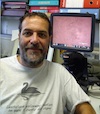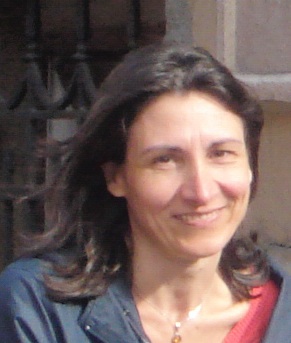Studiare
In questa sezione è possibile reperire le informazioni riguardanti l'organizzazione pratica del corso, lo svolgimento delle attività didattiche, le opportunità formative e i contatti utili durante tutto il percorso di studi, fino al conseguimento del titolo finale.
Calendario accademico
Il calendario accademico riporta le scadenze, gli adempimenti e i periodi rilevanti per la componente studentesca, personale docente e personale dell'Università. Sono inoltre indicate le festività e le chiusure ufficiali dell'Ateneo.
L’anno accademico inizia il 1° ottobre e termina il 30 settembre dell'anno successivo.
Calendario didattico
Il calendario didattico indica i periodi di svolgimento delle attività formative, di sessioni d'esami, di laurea e di chiusura per le festività.
| Periodo | Dal | Al |
|---|---|---|
| I semestre | 1-ott-2015 | 29-gen-2016 |
| II semestre | 1-mar-2016 | 10-giu-2016 |
| Sessione | Dal | Al |
|---|---|---|
| Sessione straordinaria Appelli d'esame | 1-feb-2016 | 29-feb-2016 |
| Sessione estiva Appelli d'esame | 13-giu-2016 | 29-lug-2016 |
| Sessione autunnale Appelli d'esame | 1-set-2016 | 30-set-2016 |
| Sessione | Dal | Al |
|---|---|---|
| Sess. autun. App. di Laurea L2 | 24-nov-2015 | 24-nov-2015 |
| Sess.invern. 2016 App. di Laurea L2 | 9-mar-2016 | 9-mar-2016 |
| Sess. estiva App. di Laurea L2 | 22-lug-2016 | 22-lug-2016 |
| Sess. autun 2016 App. di Laurea L2 | 22-nov-2016 | 22-nov-2016 |
| Sess. invern. 2017 App. di Laurea L2 | 10-mar-2017 | 10-mar-2017 |
| Periodo | Dal | Al |
|---|---|---|
| Festività dell'Immacolata Concezione | 8-dic-2015 | 8-dic-2015 |
| Vacanze di Natale | 23-dic-2015 | 6-gen-2016 |
| Vancanze di Pasqua | 24-mar-2016 | 29-mar-2016 |
| Anniversario della Liberazione | 25-apr-2016 | 25-apr-2016 |
| Festa del S. Patrono S. Zeno | 21-mag-2016 | 21-mag-2016 |
| Festa della Repubblica | 2-giu-2016 | 2-giu-2016 |
| Vacanze estive | 8-ago-2016 | 15-ago-2016 |
Calendario esami
Gli appelli d'esame sono gestiti dalla Unità Operativa Segreteria Corsi di Studio Scienze e Ingegneria.
Per consultazione e iscrizione agli appelli d'esame visita il sistema ESSE3.
Per problemi inerenti allo smarrimento della password di accesso ai servizi on-line si prega di rivolgersi al supporto informatico della Scuola o al servizio recupero credenziali
Per dubbi o domande leggi le risposte alle domande più frequenti F.A.Q. Iscrizione Esami
Docenti
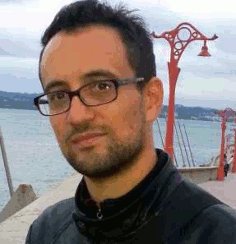
Fatone Francesco
 francesco.fatone@univr.it
francesco.fatone@univr.it
 045 802 7965
045 802 7965
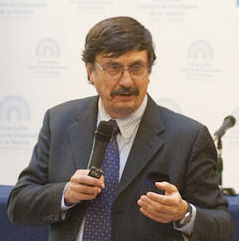
Monaco Ugo Luigi
 hugo.monaco@univr.it
hugo.monaco@univr.it
 045 802 7903; Lab: 045 802 7907 - 045 802 7082
045 802 7903; Lab: 045 802 7907 - 045 802 7082
Spena Angelo
 angelo.spena@univr.it
angelo.spena@univr.it
 045 683 5623
045 683 5623
Ugolini Simone
 simone.ugolini@univr.it
simone.ugolini@univr.it
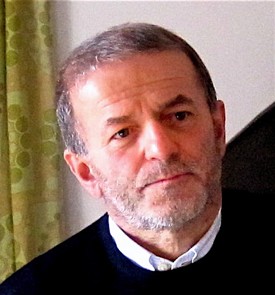
Vallini Giovanni
 giovanni.vallini@univr.it
giovanni.vallini@univr.it
 045 802 7098; studio dottorandi: 045 802 7095
045 802 7098; studio dottorandi: 045 802 7095
Piano Didattico
Il piano didattico è l'elenco degli insegnamenti e delle altre attività formative che devono essere sostenute nel corso della propria carriera universitaria.
Selezionare il piano didattico in base all'anno accademico di iscrizione.
1° Anno
| Insegnamenti | Crediti | TAF | SSD |
|---|
2° Anno Attivato nell'A.A. 2016/2017
| Insegnamenti | Crediti | TAF | SSD |
|---|
3° Anno Attivato nell'A.A. 2017/2018
| Insegnamenti | Crediti | TAF | SSD |
|---|
Un insegnamento a sceltaUn insegnamento a scelta| Insegnamenti | Crediti | TAF | SSD |
|---|
| Insegnamenti | Crediti | TAF | SSD |
|---|
| Insegnamenti | Crediti | TAF | SSD |
|---|
Un insegnamento a sceltaUn insegnamento a sceltaLegenda | Tipo Attività Formativa (TAF)
TAF (Tipologia Attività Formativa) Tutti gli insegnamenti e le attività sono classificate in diversi tipi di attività formativa, indicati da una lettera.
Filosofia della scienza (2016/2017)
Codice insegnamento
4S00960
Docente
Coordinatore
Crediti
6
Lingua di erogazione
Italiano
Settore Scientifico Disciplinare (SSD)
M-FIL/02 - LOGICA E FILOSOFIA DELLA SCIENZA
Periodo
II sem. dal 1-mar-2017 al 9-giu-2017.
Obiettivi formativi
Il corso si propone di fornire un'introduzione alla riflessione filosofica sul rapporto tra le visioni della scienza e le loro conseguenze sul piano etico nella prospettiva delle biotecnologie. Al termine dell’insegnamento lo studente dovrà dimostrare di avere conoscenze, capacità di comprensione e di riflessione relativamente a questi aspetti.
Programma
Il significato di "episteme" ed "ethos" nel concetto filosofico di natura.
Il programma si compone di due parti:
1)
- Introduzione alla filosofia della scienza;
- La riflessione sulla scienza e la concezione della natura nei seguenti autori ed ambiti tematici: Aristotele, il pensiero pitagorico, Platone, Claudio Tolomeo, la sistematizzazione deduttiva della scienza in Euclide e Archimede, l’atomismo antico, lo sviluppo del metodo aristotelico nel Medioevo, “salvare i fenomeni”, N. Copernico, Keplero, la legge di Bode, G. Galilei, Francesco Bacone, R. Cartesio, I. Newton, G.W. Leibniz, D. Hume, I. Kant, K.R. Popper, T.S. Kuhn;
2)
- Il rapporto tra scienza, etica e bioetica: fondamenti, approcci metodologici e classificazioni;
- Aspetti di bioetica umana, etica animale, bioetica ambientale, teorie etiche ed ecologia;
- Il dialogo tra comunità scientifica e società, la Convenzione sui Diritti dell’Uomo e la biomedicina, l’etica della responsabilità.
Testi di riferimento:
1) J. Losee, Filosofia della scienza. Un'introduzione, trad. it. di P. Budinich, Il Saggiatore, Milano 2006.
2) M. Tallacchini, F. Terragni, Le biotecnologie. Aspetti etici, sociali e ambientali, Bruno Mondadori, Milano 2004.
Modalità di insegnamento: lezioni frontali.
Modalità d'esame
Prova scritta concernente il programma costituita da domande a scelta multipla e a trattazione breve, concernente il programma e i testi di riferimento indicati. Per superare l’esame gli studenti dovranno dimostrare di aver raggiunto gli obiettivi formativi.
Tipologia di Attività formativa D e F
Insegnamenti non ancora inseriti
Prospettive
Avvisi degli insegnamenti e del corso di studio
Per la comunità studentesca
Se sei già iscritta/o a un corso di studio, puoi consultare tutti gli avvisi relativi al tuo corso di studi nella tua area riservata MyUnivr.
In questo portale potrai visualizzare informazioni, risorse e servizi utili che riguardano la tua carriera universitaria (libretto online, gestione della carriera Esse3, corsi e-learning, email istituzionale, modulistica di segreteria, procedure amministrative, ecc.).
Entra in MyUnivr con le tue credenziali GIA: solo così potrai ricevere notifica di tutti gli avvisi dei tuoi docenti e della tua segreteria via mail e a breve anche tramite l'app Univr.
Prova Finale
Per essere ammessi alla prova finale occorre avere conseguito tutti i crediti nelle attività formative previste dal piano degli studi. Alla prova finale sono riservati 3 CFU. La prova finale consiste nella discussione di un elaborato scritto, di non più di 25 cartelle, riguardante tematiche inerenti il percorso di studi, eventualmente affrontate nel corso del tirocinio sotto la guida di un Relatore. La relazione potrà essere redatta anche in lingua inglese ed una copia sarà trasferita alla Segreteria mediate apposita procedura telematica. Il docente referente e altri due docenti, costituiranno la Commissione di valutazione. I lavori della Commissione non sono regolati da convocazioni ufficiali e hanno luogo su accordo tra i quattro soggetti interessati.
La valutazione dell’elaborato sarà basata sui seguenti criteri: livello di approfondimento del lavoro svolto, impegno critico del laureando, accuratezza dello svolgimento. Alla fine della presentazione, i docenti stileranno una breve nota di valutazione con espressione di un voto sintetico. Questa nota sarà trasferita alla Segreteria competente, almeno 5 giorni prima della seduta di laurea, per la successiva formulazione del voto definitivo da parte della Commissione di laurea che procederà alla proclamazione. Il punteggio finale di Laurea è espresso in centodecimi con eventuale lode. Il punteggio minimo per il superamento dell’esame finale è di 66/110.
Il voto di ammissione è determinato rapportando la media degli esami di profitto ponderata sui crediti, a 110 e successivamente arrotondando il risultato all’intero più vicino. A parità di distanza, si arrotonda all’intero superiore.
Per la prova finale è previsto un incremento al massimo di 8/110 punti rispetto al voto di ammissione, di cui 4 punti riservati alla valutazione dell’esame di laurea e 4 punti riservati alla valutazione del curriculum dello studente. Nella valutazione del curriculum si tiene conto del tempo impiegato dallo studente per giungere alla laurea, del numero di lodi conseguite, e di eventuali esperienze all’estero.
Va attribuito un punto in più ai candidati che soddisfano i seguenti requisiti:
- laurea in corso
- media delle votazioni degli esami di almeno di 26/30.
L’attribuzione della lode, nel caso di un incremento che porti ad una votazione pari a 110/110, è a discrezione della commissione di esame e viene attribuita solo se il parere dei membri della commissione è unanime.
Elenco delle proposte di tesi e stage
| Proposte di tesi | Area di ricerca |
|---|---|
| Studio delle proprietà di luminescenza di lantanidi in matrici proteiche | Synthetic Chemistry and Materials: Materials synthesis, structure-properties relations, functional and advanced materials, molecular architecture, organic chemistry - Colloid chemistry |
| Nanomateriali ibridi organici-inorganici multifunzionali per applicazioni in Biotecnologie e Chimica Verde | Synthetic Chemistry and Materials: Materials synthesis, structure-properties relations, functional and advanced materials, molecular architecture, organic chemistry - New materials: oxides, alloys, composite, organic-inorganic hybrid, nanoparticles |
| Dinamiche della metilazione del DNA e loro contributo durante il processo di maturazione della bacca di vite. | Argomenti vari |
| Risposte trascrittomiche a sollecitazioni ambientali in vite | Argomenti vari |
| Studio delle basi genomico-funzionali del processo di embriogenesi somatica in vite | Argomenti vari |
Modalità di frequenza
Come riportato nel Regolamento Didattico, non è previsto un obbligo generalizzato di frequenza. I singoli docenti sono tuttavia liberi di richiedere un minimo di ore di frequenza per l’ammissibilità̀ all’esame di profitto dell’insegnamento di cui sono titolari. In tal caso il controllo della frequenza alle attività didattiche è stabilito secondo modalità preventivamente comunicate agli studenti.








